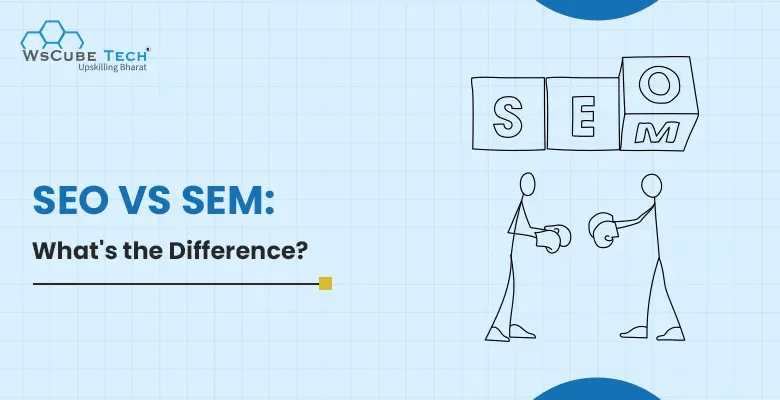If you are in the field of digital marketing, the terms SEO and SEM are so mainstream for you. Both Search Engine Optimization (SEO) and Search Engine Marketing (SEM) sound similar and have a difference of only one word. But these two are not the same.
There are several differences between SEO vs SEM that you must know, along with the importance of both.
Both techniques are used for marketing on search engines like Google, Bing, etc. Marketing on these search engines can be done by optimizing a website for organic traffic, as well as running paid campaigns with PPC advertising.
In digital marketing, both are applied or implemented for better results. But what is SEO and SEM? How is SEO different from SEM? What is the importance of both? What are the similarities between the two?
Upskill Yourself With Live Training (Book Free Class)
Let’s understand everything related to SEO and SEM difference in this quick yet comprehensive write-up.
SEO and SEM Full Form
Before understanding what is difference between SEO and SEM, let’s know the full forms of both terms:
- SEO stands for Search Engine Optimization.
- The full form of SEM is Search Engine Marketing.

Is SEM and SEO the Same?
The quick answer to this question is ‘no’. SEO and SEM are not the same.
It is because SEM is a broad term that includes marketing on search engines in multiple ways. One way is by optimizing the website for search engines and driving traffic organically. Another way is by running paid campaigns, for instance, using Google Ads and then promoting the website.
Both these things come under search engine marketing.
Whereas, SEO is a part of SEM where you work on your website so that it can rank higher on Google and other search engines.
Going forward in this article, we will understand the SEO and SEM meaning and differences in detail.
What is SEO (Search Engine Optimization)?
It is the practice or process of optimizing a website for users and search engines so that it can rank higher and bring relevant traffic to the site.
Here, a webmaster or SEO professional applies all the white-hat techniques to the website or as recommended by the search engine. For example, Google considers the loading speed of a website, its security, structure, quality of content, user experience, etc., while ranking a website on its search engine.
So, while doing website SEO, all these things are taken care of. But, eventually, the motive is to increase website ranking and bring more users.
Moreover, all the efforts put into SEO are meant for driving organic traffic, without running any advertisements or PPC campaigns.
Must Read: How to Secure WordPress Website? Top Tips & Best Practices
Usually, there are three important aspects of search engine optimization:
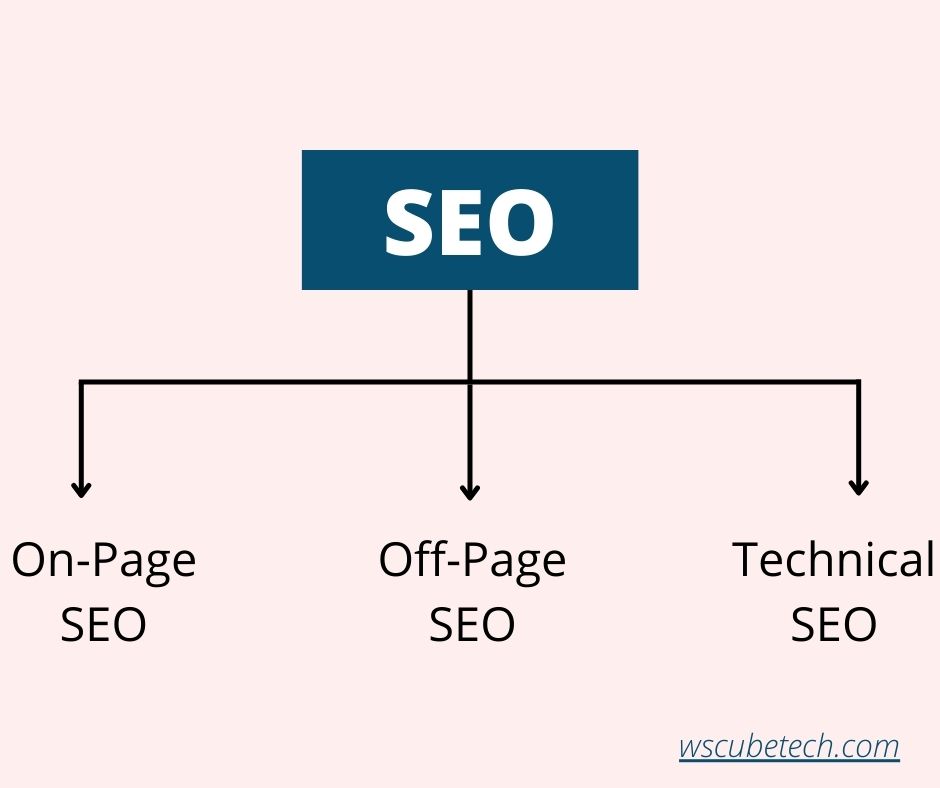
1. On-Page SEO
This is the most important part of search engine optimization. It is called on-page SEO because, here, all the efforts are put on the website that you want to optimize.
For instance, if the loading speed is slow, the technical aspects of the website are worked upon. Creating and publishing high-quality content, using meta tags and descriptions, proper heading tags, making the site highly secure, etc., are the things that come under on-page SEO.
2. Off-Page SEO
The process of building or earning backlinks from authority websites in relevant niches comes under off-page SEO. When other websites that are trustable and authoritative give links to your website, it triggers a positive signal to search engines. This helps in improving keyword rankings.
For example, link building can be done with guest blogging, article submission, classified submission, image submission, social bookmarking, etc.
3. Technical SEO
When you work on the technical aspects of a website for SEO purposes, it is called technical SEO. You can count technical SEO as part of on-page SEO.
For example, loading speed, reliable web hosting server, optimum coding, SSL certificate, Google AMP, etc., are some parts of technical search engine optimization.
Interview Questions for You to Prepare for Jobs
| Digital Marketing Interview Questions | SEO Interview Questions |
| Email Marketing Interview Questions | Content Writing Interview Questions |
What is SEM (Search Engine Marketing)?
As mentioned above, SEM stands for Search Engine Marketing. It is a crucial process or practice in digital marketing, which includes marketing on search engines.
Now, the thing to understand here is that marketing on search engines can be done in two ways.
First, by optimizing the website to drive organic traffic, which is the SEO way.
Second, by running ad campaigns on search engines, which is the PPC way. For instance, for running ads on Google SERP, the Google Ads platform is used.
You might have noticed that when you search for anything on Google, the search results page shows you both organic results and ads.
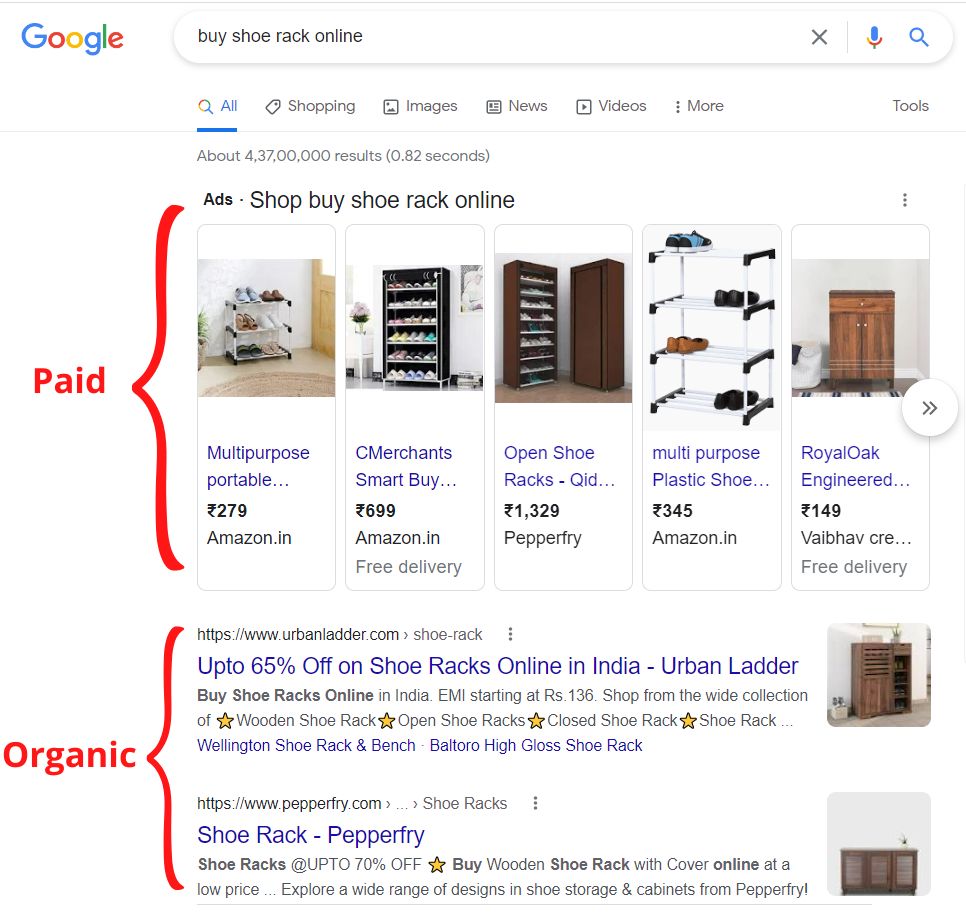
The paid results are shown by using bidding on keywords and paying for every click, which is called PPC advertising. You can use Google Ads to run paid campaigns on Google SERP.
The organic results are the outcome of SEO efforts. Eventually, both paid and organic results come under the umbrella of Search Engine Marketing, because these are being done on search engines for the marketing of a business or website.

What is the Relationship Between SEO and SEM?
SEO is a crucial part of search engine marketing. SEM can be called an umbrella under which both SEO and PPC come.
In simple words, SEO is part of SEM.
An SEM professional will have skills in both SEO and PPC. But an SEO professional might not have both skills.
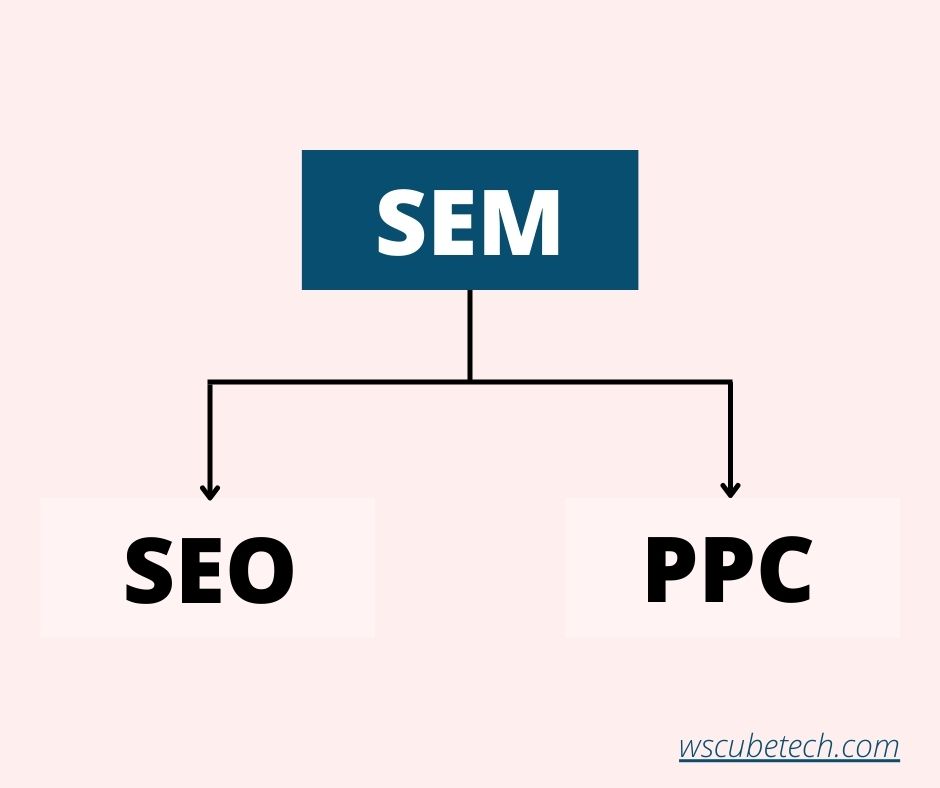
SEO vs SEM Difference in Digital Marketing
Now, let’s come down to the main question— what is the difference between SEO and SEM?
The above explanation about both practices might have helped you understand the basic SEO vs SEM difference. But, let’s break things down further to get a better hold of it.
Suggested Reading: 30+ Most Asked Digital Marketing Interview Questions & Answers
Time Required to See Results: SEM vs SEO
If you ask me what you will choose if you want to see faster results, then my answer will be SEM, or PPC, to be specific.
It is because SEO needs patience and time. You can’t optimize everything in a day and expect overnight results. The time required to get SEO results can go higher if the website is new.
SEO can take months and years for your keywords to rank on the first page of Google. Obviously, the keyword difficulty also matters.
Whereas, if we talk about the PPC part in SEM, it can help you drive overnight results. You can learn Google Ads and use the platform to run PPC campaigns on search engines.
In terms of how much time SEM takes for results, you can run ad campaigns in the evening, and you will start seeing results in the morning. The niche, ad optimization, bidding, etc., also matter in PPC when it comes to results.
So, to be precise, in SEM, PPC is better than SEO if you want faster results. But if you have achieved the first page rankings with SEO, it is more sustainable in the long term.
Skills Required for SEO and SEM Marketing
One should have the right SEO skills to drive organic results from search engines. But if you want to do search engine marketing, then you need to have skills in both SEO and PPC.
By opting for an offline or online SEO course, you can become a master at search engine optimization.
If you can want to hold expertise in varied areas, then it is better to go for an offline or online digital marketing course. In digital marketing courses, all aspects of the field are covered, including SEO, PPC, SMM, Content Marketing, YouTube Marketing, and more.
So, to summarize, here is the SEO and SEM difference in terms of skills:
- Skills for SEO Marketing: SEO
- Skills for SEM Marketing: SEO and PPC
Must Read: Top 78 Content Writing Interview Questions and Answers For Freshers & Experienced
Cost Difference Between SEM vs SEO Marketing
There is a never-ending debate on which is better from SEO and SEM, in terms of costs. Many digital marketers believe that SEO is cost-effective because it drives free traffic to the website. What it means is that you don’t have to pay for every click if your website is ranking well on Google.
On the other hand, if you opt for PPC in SEM, then you need to pay for every click. Once your budget is over or you stop running ads, you will not get results. But SEO will bring you traffic every day without paying for clicks.
This means SEO traffic is free.
But this is actually a myth. It takes the investment of time, money, and resources to optimize a website for search engines and improve the keyword rankings. The skills of SEOs, content writers, as well as web developers, are involved in search engine optimization.
Talking about SEM, or PPC especially, it needs the skills of an ad expert, and sometimes a content writer.
So, which is cost-effective between SEO and PPC?
The answer is that it depends on whether you want the results for the short-term or long-term. For a short period of time, it is okay to go with PPC, and it will cost you lesser compared to SEO. But as soon as you hold the PPC campaigns, you will not see any results.
SEO vs SEM Comparison: Which is Better for Business?
Now that you know what is the difference between SEM and SEO or how is SEO different from SEM, the final question remains which one is better for a business or website?
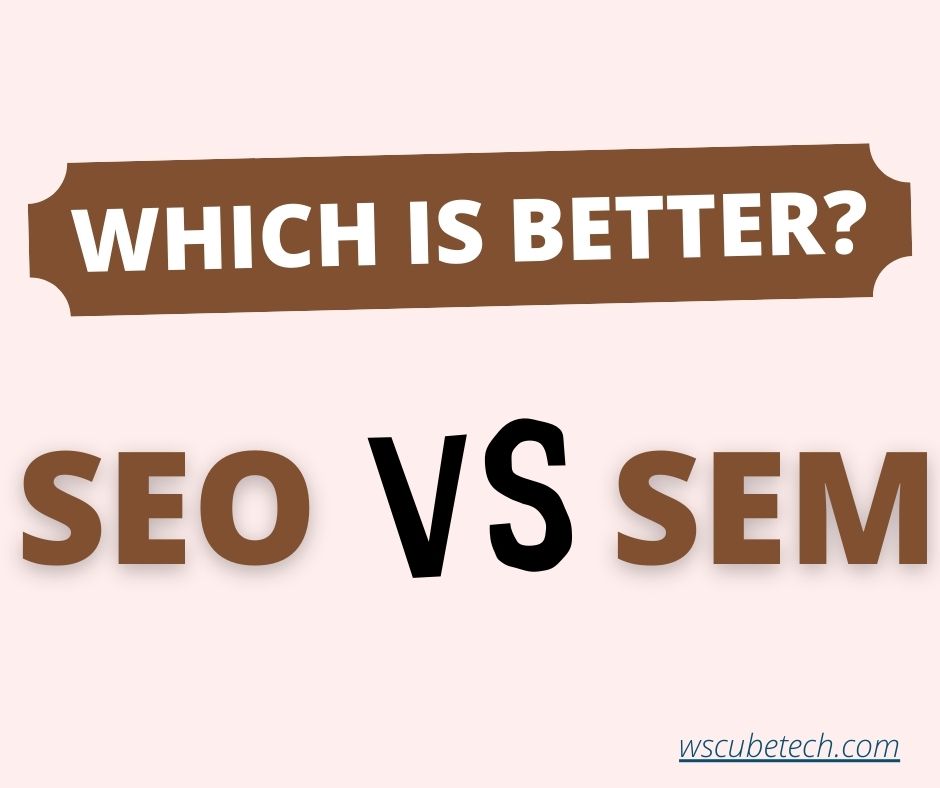
Let’s understand when to use SEO, when to use PPC, and when to go for SEM as per the scenario and other factors.
SEO is Better If:
You are on a budget that you can’t spend on advertising on a regular basis. Moreover, if you are in a niche that is not highly competitive or are targeting local keywords, then SEO is a better option.
In most cases, startups and small businesses should go for search engine optimization. It is true that results will not be instant, but PPC needs investment consistently, and it might not drive results for all types of businesses.
In addition, if your focus is also on blogging and building massive traffic in the long term, SEO is the way to go for.
PPC is Better If:
You can spend money on advertising on a regular basis. We know that PPC ad campaigns help in driving quick results compared to SEO.
If you are an individual or business ready to set a weekly or monthly budget and can spend it, then PPC is the way to go for.
While running PPC ads, you must ensure that you have the right skills. It is because you might end up draining your ad budget. For this, you can learn how to run paid ads, or hire someone who is good at it.
SEM (SEO + PPC) is Better If:
You have a new website and want some initial leads fast. In such a case, you can invest in SEO as you want to drive traffic organically in the long term, but need some business right from the time of getting online.
An important thing when choosing SEM is that you should have the right budget. Also, both these things need a good skillset. If one person works on both things, it will be difficult to drive results, especially through SEO.
So, you need to make the decision wisely by understanding the difference between SEO and SEM marketing.

Frequently Asked Questions (FAQs) About SEM and SEO
No. These are not the same. SEO is a part of SEM. Search Engine Marketing includes marketing on search engines both organically and using paid options. But SEO is all about organic results.
Search Engine Optimization.
Search Engine Marketing.
Yes. Search Engine Optimization is part of SEM.
Wrapping Up:
Search Engine Optimization and Marketing are both so common and closely related that even the professionals in digital marketing get confused. Hope this write-up helped you understand the meaning of SEO and SEM, as well as the relation and differences between the two.
For any questions related to SEO vs SEM, feel free to drop your comments below.
Read more blogs:



